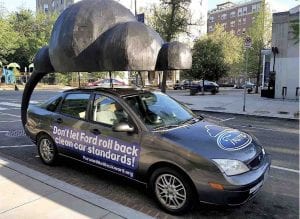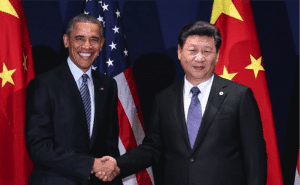Prime minister Malcolm Turnbull came under pressure over the weekend to match the rhetoric and actions of Barack Obama, after the US president announced he would put environmental consideration over short-term business outcomes, and refused approval for the controversial Keystone XL oil pipeline.
For Obama, it was a relatively easy decision. The US was not likely to get much economic benefit from allowing oil from Canadian tar sands to be piped across the country to the export market.
There were only 35 permanent jobs at stake, it would have had zero impact on US fuel security, and new Canadian prime minister Justin Trudeau was unlikely to be anywhere near as upset by the rejection as his predecessor Stephen Harper would have been.

Green groups want Turnbull to do the same to the equally controversial Carmichael coal mine in the Galilee Basin, which, based on Adani’s own reports, will not deliver anywhere near the economic benefits pretended by the Abbott government, yet could have a significant environmental impact.
Turnbull’s problem is that, unlike Obama, he represents a party that has not only argued the “moral” case
for coal mining, but has also sought to overcome financing problems by proposing to use funds from a new $5 billion “infrastructure fund”, and has sought to remove the right of green groups to take court action against the project.
Turnbull is, supposedly, going to make a “significant” announcement on climate change on the first day of the Paris talks, but it seems this is going to be more about rainforest

protection than it is about preventing new thermal coal mines.
But on Monday, the Australian Conservation Foundation lodged papers with the Federal Court, applying to challenge the approval for the mine given by environment minister Greg Hunt.
ACF says it will argue the minister failed to consider whether the impact of climate pollution, resulting from burning the mine’s coal, would be inconsistent with Australia’s international obligations to protect the World Heritage-listed Great Barrier Reef.
ACF president Geoff Cousins describes the action as “historic” and compared it to the Franklin River dam campaign, and said that allowing the mine would be “reckless and irresponsible”.
“ACF believes the Turnbull government’s re-approval of a coal mine that would produce more climate pollution than New Zealand does annually is reckless and irresponsible,” Cousins said in a statement.
“Taking legitimate legal action in the public interest is central to keeping governments accountable in a democracy.
“This action is historic; it’s the first case that has sought to test the Environment Minister’s World Heritage obligations as they relate to the climate change impacts on the Reef caused by pollution from burning a mine’s coal.”
Business under pressure to match rhetoric
The Turnbull government is not the only one to come under pressure to match their talk with actions. Turnbull and Hunt both argue that Australia is committed to limiting global warming to 2°C, but are yet to deliver policies to do so. Business is in the same boat.
In recent weeks there have been major headlines in mainstream media about the “engagement” of leading corporates in supporting policies that lead to the 2°C outcome.
But just how far are businesses prepared to travel, themselves?
One of the major initiatives touted in recent weeks is the “We Mean Business” initiative, sponsored by a range of environmental groups. We don’t want to downplay their efforts, but it underlines just how big the gap is between rhetoric and action.
Consider this table below: These are from the companies hailed as showing “leadership” on climate change in Australia.
Yet, less than half of them committed to adopting a “science-based” greenhouse gas emissions reduction target. i.e. one that is in accordance with the global, and national target, to limit global warming to a maximum 2°C.
It should be noted that two of them, CBA and NAB, subsequently announced other initiative to act “in accordance” with the 2°C target. But environmentalists are holding a wait and see approach. NAB is promising to allocate $18 billion on climate and clean energy projects. Goldman Sachs, with a similar asset base, is promising to allocate $140 billion.
Only three out of the 12 Australian companies said they would source 100 per cent renewables for their own operations. This included renewable energy developer Infigen Energy, and Origin Energy, although the latter is only doing this for its own “corporate use” and not for its customers.
It seems, for the others, this is still too hard, even though international groups such as IKEA, Google and others such as Starbucks, WalMart and Nike have a 100 per cent renewable goal.
Only half the Australian companies supported a carbon price.
James Day, a director of CDP and the We Mean Business initiative, and organiser of last week’s Climate Business Summit, says it is, nonetheless, an important step. “When motivating change, there are many pathways to heaven,” he told RenewEconomy.











